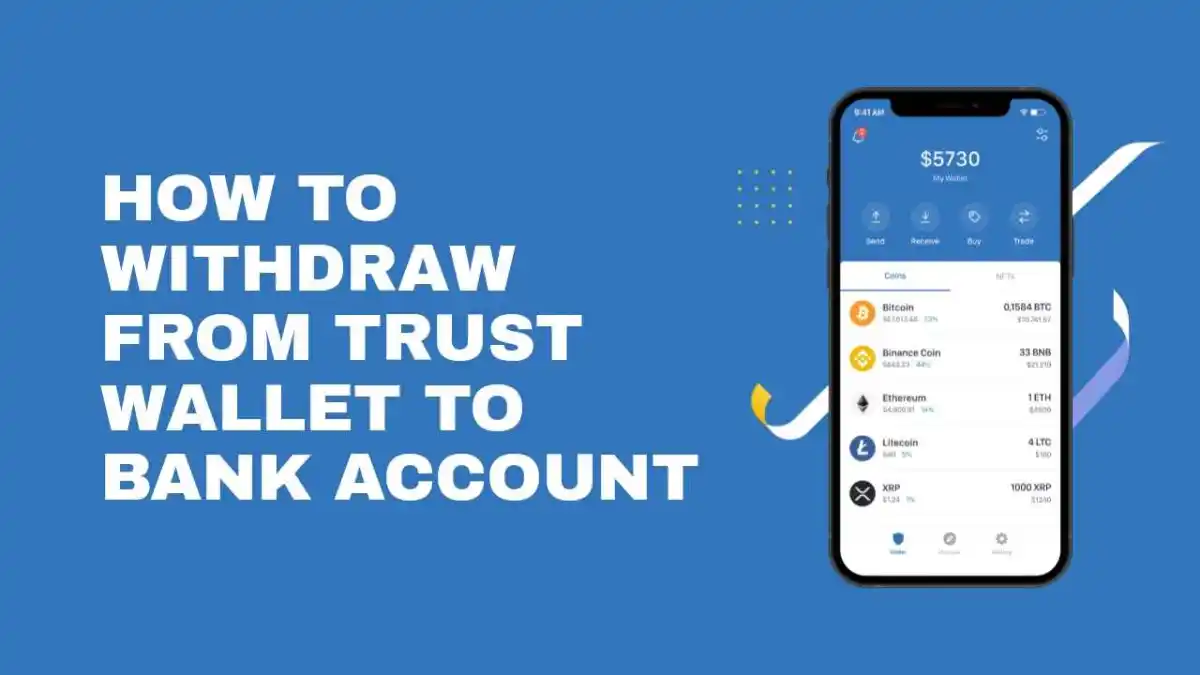Directly transferring money from Trust Wallet to a bank account is not possible. You need to first convert your cryptocurrencies to fiat on a cryptocurrency exchange, then withdraw the fiat to your bank account.

Understanding the Process of Converting Crypto to Fiat
The Basics of Crypto to Fiat Conversion
Crypto to fiat conversion involves exchanging a cryptocurrency, like Bitcoin or Ethereum, for a government-issued currency, such as USD, EUR, or GBP. This process typically requires using a cryptocurrency exchange or a peer-to-peer platform where users can sell their crypto to buyers interested in purchasing with fiat. Once the transaction is completed, the seller can withdraw the fiat currency to their bank account, effectively converting their digital assets into traditional money.
Platforms That Facilitate Crypto to Fiat Transactions
Several platforms facilitate the conversion of crypto to fiat, including:
- Centralized Exchanges: Platforms like Coinbase, Binance, and Kraken allow users to sell cryptocurrencies directly for fiat and withdraw the funds to their bank accounts.
- Peer-to-Peer (P2P) Platforms: Websites like LocalBitcoins and Paxful connect buyers and sellers directly, offering more flexibility in payment methods.
- Crypto Payment Services: Some services offer to convert your crypto to fiat instantly and transfer the funds to your bank, though they might charge higher fees for the convenience.
Exchange Rates and Fees Involved
When converting crypto to fiat, it’s important to consider the exchange rates and fees involved:
- Exchange Rates: Cryptocurrency exchange rates can fluctuate rapidly. It’s crucial to check the current rate at the time of conversion to ensure you are getting a fair deal.
- Transaction Fees: Exchanges and platforms typically charge a fee for converting and withdrawing fiat. These fees vary by platform and can affect the total amount of fiat you receive.
- Network Fees: Depending on the cryptocurrency being sold, there may also be a network fee for transferring the crypto from your wallet to the exchange or buyer. This fee is usually determined by the blockchain network’s current congestion.
Understanding these elements is vital for anyone looking to convert cryptocurrencies to fiat currency efficiently, ensuring they maximize the fiat received while minimizing costs.
Steps to Transfer from Trust Wallet to Bank Account
Selling Cryptocurrency for Fiat on an Exchange
- Choose an Exchange: Select a reputable cryptocurrency exchange that supports fiat withdrawal to your bank account and offers a trading pair for your specific cryptocurrency.
- Transfer Crypto to the Exchange: Generate a deposit address from the exchange for the cryptocurrency you wish to sell. Then, use Trust Wallet to send your crypto to this address.
- Sell Your Cryptocurrency: Once your transfer is confirmed, use the exchange’s trading platform to sell your cryptocurrency for fiat. You can choose a market order for an immediate sale at the current price or a limit order to set a desired price.

Withdrawing Fiat to Your Bank Account from the Exchange
- Set Up Withdrawal Method: Add your bank account details to the exchange. This process may require you to verify your identity and bank account ownership, aligning with KYC (Know Your Customer) regulations.
- Initiate the Withdrawal: After selling your cryptocurrency, navigate to the withdrawal section of the exchange, select your bank account, and specify the amount of fiat you wish to withdraw.
- Confirm the Transaction: Double-check the withdrawal details and confirm the transaction. Some exchanges may require additional verification for withdrawal for security purposes.
Time Frames and Security Measures
- Transaction Time Frames: The time it takes to complete the transfer from Trust Wallet to your bank account can vary based on blockchain congestion, exchange processing times, and bank processing times. It can range from a few hours to several business days.
- Security Measures: Ensure the security of your transaction by enabling two-factor authentication (2FA) on your exchange account, verifying the security of your internet connection, and confirming the legitimacy of the withdrawal addresses. Be cautious of phishing attempts and only perform transactions on secure and trusted devices.
Choosing the Right Exchange for Conversion
Criteria for Selecting a Crypto Exchange
When selecting a cryptocurrency exchange for converting your assets from Trust Wallet to fiat, consider the following criteria:
- Reputation and Reliability: Choose exchanges known for their reliability and positive reputation in the crypto community. Look for user reviews and any history of security breaches.
- Regulatory Compliance: An exchange that adheres to regulatory requirements is generally more trustworthy. Compliance indicates a commitment to operating within legal frameworks, enhancing user protection.
- Supported Currencies and Payment Methods: Ensure the exchange supports the cryptocurrencies you intend to sell and offers withdrawal options to your preferred bank account.
- Fees and Exchange Rates: Compare the fees for trading and withdrawing funds, as well as the exchange rates offered. Lower fees and competitive rates maximize your fiat returns.
- Security Measures: Look for exchanges with strong security protocols, such as two-factor authentication (2FA), withdrawal whitelisting, and cold storage of assets.
Recommended Exchanges for Trust Wallet Users
For Trust Wallet users looking to convert crypto to fiat, the following exchanges are widely recommended:
- Coinbase: Known for its user-friendly interface and strong regulatory compliance, making it a solid choice for beginners.
- Binance: Offers a broad range of cryptocurrencies and competitive fees, with a robust platform for both novice and experienced traders.
- Kraken: Praised for its security measures and comprehensive fiat withdrawal options, suitable for users worldwide.
Verifying Exchange Security and Legitimacy
To ensure you’re using a secure and legitimate exchange, take the following steps:
- Research the Exchange’s History: Look into the exchange’s track record, focusing on any past security incidents and how they were resolved.
- Check for Regulatory Licenses: Verify that the exchange is registered with relevant financial authorities and complies with necessary regulations.
- Read User Reviews: User experiences can offer valuable insights into the exchange’s performance, customer service quality, and reliability.
- Explore the Exchange’s Security Features: Familiarize yourself with the security measures the exchange employs to protect user assets and data.
Regulatory Considerations and Compliance
Understanding Your Local Regulations on Crypto
Cryptocurrency regulations vary significantly from one jurisdiction to another, affecting how you can legally use, trade, and tax cryptocurrencies. It’s crucial to:
- Stay Informed: Regularly research and stay up-to-date with the local laws and regulations regarding cryptocurrency in your country or region.
- Compliance: Ensure that any actions you take, including trading, investing, or converting crypto to fiat, comply with local laws to avoid legal penalties.
The Importance of KYC and AML Compliance
Know Your Customer (KYC) and Anti-Money Laundering (AML) regulations are essential components of the cryptocurrency ecosystem, aimed at preventing illegal activities. When using exchanges or financial services, you may need to:
- Verify Identity: Provide personal identification documents to verify your identity when registering on crypto exchanges or financial platforms that adhere to KYC and AML regulations.
- Understand the Implications: These measures are in place to add a layer of security and ensure the integrity of financial transactions, protecting both users and platforms from fraud and money laundering.

Tax Implications of Converting Crypto to Fiat
Converting cryptocurrency to fiat currency can have tax implications, depending on your country’s tax laws. It’s important to:
- Record Transactions: Keep detailed records of all your cryptocurrency transactions, including dates, amounts, and the fair market value in fiat currency at the time of the transaction.
- Understand Tax Obligations: Familiarize yourself with how cryptocurrency transactions are taxed in your jurisdiction. Profits from selling cryptocurrencies are often subject to capital gains tax, but the exact regulations can vary.
- Seek Professional Advice: Consider consulting with a tax professional who is knowledgeable about cryptocurrency to ensure compliance and optimize your tax situation.
Navigating the regulatory landscape and understanding the compliance requirements are crucial steps in safely and legally managing your cryptocurrency assets. Being proactive in dealing with KYC, AML, and tax obligations will help you avoid potential legal and financial issues.